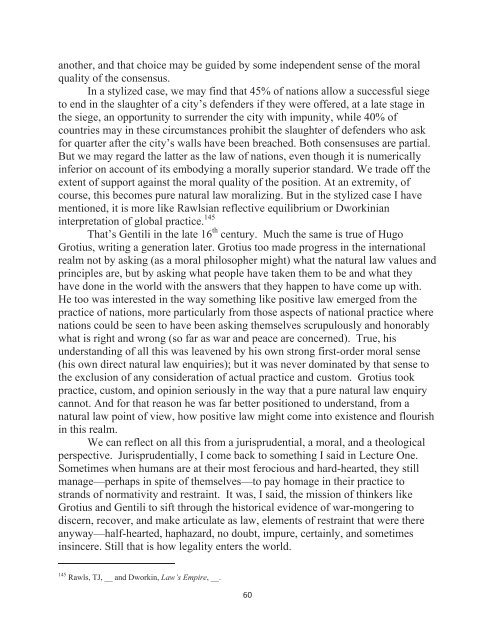International Legal Evangelism: Intelligence, Reconnaissance & Missions
International Legal Evangelism: Intelligence, Reconnaissance & Missions
International Legal Evangelism: Intelligence, Reconnaissance & Missions
Create successful ePaper yourself
Turn your PDF publications into a flip-book with our unique Google optimized e-Paper software.
another, and that choice may be guided by some independent sense of the moral<br />
quality of the consensus.<br />
In a stylized case, we may find that 45% of nations allow a successful siege<br />
to end in the slaughter of a city’s defenders if they were offered, at a late stage in<br />
the siege, an opportunity to surrender the city with impunity, while 40% of<br />
countries may in these circumstances prohibit the slaughter of defenders who ask<br />
for quarter after the city’s walls have been breached. Both consensuses are partial.<br />
But we may regard the latter as the law of nations, even though it is numerically<br />
inferior on account of its embodying a morally superior standard. We trade off the<br />
extent of support against the moral quality of the position. At an extremity, of<br />
course, this becomes pure natural law moralizing. But in the stylized case I have<br />
mentioned, it is more like Rawlsian reflective equilibrium or Dworkinian<br />
interpretation of global practice. 145<br />
That’s Gentili in the late 16 th century. Much the same is true of Hugo<br />
Grotius, writing a generation later. Grotius too made progress in the international<br />
realm not by asking (as a moral philosopher might) what the natural law values and<br />
principles are, but by asking what people have taken them to be and what they<br />
have done in the world with the answers that they happen to have come up with.<br />
He too was interested in the way something like positive law emerged from the<br />
practice of nations, more particularly from those aspects of national practice where<br />
nations could be seen to have been asking themselves scrupulously and honorably<br />
what is right and wrong (so far as war and peace are concerned). True, his<br />
understanding of all this was leavened by his own strong first-order moral sense<br />
(his own direct natural law enquiries); but it was never dominated by that sense to<br />
the exclusion of any consideration of actual practice and custom. Grotius took<br />
practice, custom, and opinion seriously in the way that a pure natural law enquiry<br />
cannot. And for that reason he was far better positioned to understand, from a<br />
natural law point of view, how positive law might come into existence and flourish<br />
in this realm.<br />
We can reflect on all this from a jurisprudential, a moral, and a theological<br />
perspective. Jurisprudentially, I come back to something I said in Lecture One.<br />
Sometimes when humans are at their most ferocious and hard-hearted, they still<br />
manage—perhaps in spite of themselves—to pay homage in their practice to<br />
strands of normativity and restraint. It was, I said, the mission of thinkers like<br />
Grotius and Gentili to sift through the historical evidence of war-mongering to<br />
discern, recover, and make articulate as law, elements of restraint that were there<br />
anyway—half-hearted, haphazard, no doubt, impure, certainly, and sometimes<br />
insincere. Still that is how legality enters the world.<br />
<br />
145 Rawls, TJ, __ and Dworkin, Law’s Empire, __.<br />
<br />
60

















